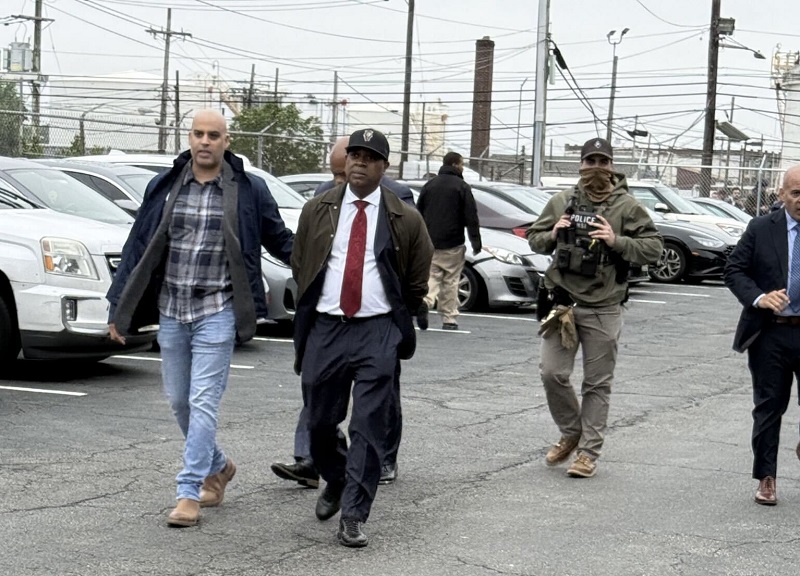In a powerful and deeply emotional moment that stunned onlookers and resonated far beyond the gates of Delaney Hall, Newark Mayor Ras Baraka was arrested Friday afternoon while standing firm in protest of a controversial federal immigration detention center.
Baraka, known for his unwavering commitment to justice and community values, found himself in the center of a dramatic confrontation with federal agents—an act that now stands as both a protest and a poignant testament to the fight for human dignity.
“They Can’t Arrest Me Out Here” — The Final Words Before the Clash

Earlier in the day, Baraka had attempted to join three members of New Jersey’s congressional delegation—Reps.
Robert Menendez, LaMonica McIver, and Bonnie Watson Coleman—in a spontaneous visit to the Delaney Hall facility, operated under a $1 billion contract by the GEO Group.
Their goal: inspect the premises and challenge the facility’s legitimacy due to alleged permitting issues.
But what began as a peaceful gathering quickly turned volatile.
According to witnesses, when the mayor was denied entry and returned to the public side of the gate, tensions escalated.
“There was yelling and pushing,” said activist Viri Martinez. “Then the officers swarmed Baraka. They threw one of the organizers to the ground.
They put Baraka in handcuffs and put him in an unmarked car.”
Moments before his arrest, Baraka stood behind the fence, speaking through the metal barrier: “I’m not on their property.
They can’t come out on the street and arrest me.” What followed was swift and stunning.
ICE agents in face coverings surrounded him, dragging the mayor away as supporters chanted “Shame!” It was an arrest that felt less like enforcement and more like a silencing of protest.
A Legacy of Leadership—and Now, Resistance
Baraka, a Democrat currently running to succeed Governor Phil Murphy, has long been vocal in his opposition to policies that criminalize immigration.
For him, this wasn’t just about permits or politics—it was a stand for values that have defined his leadership in Newark.
In the aftermath, civil rights advocates and political leaders across New Jersey condemned the arrest.
State Attorney General Matthew J. Platkin called it deeply troubling, especially given the peaceful nature of the protest. “No state or local law enforcement agencies were involved,” he clarified.
Julie Moreno of American Families United added: “The ICE personnel came out aggressively… It didn’t make any sense why they chose that moment to grab him while he was outside the gates.”
A Troubling Contract, a Fierce Backlash
Delaney Hall—next to a county prison and once a halfway house—is now part of a $1 billion, 15-year contract awarded to GEO Group, a private prison operator with deep ties to federal detention policies.
The facility began intake on May 1 and is one of two facilities meant to expand ICE’s bed count to 23,000 nationwide.
But in Newark, the community—led by Mayor Baraka—refused to stay silent.
His lawsuit against GEO, his protest at the gates, and now his arrest, have cemented his legacy as a leader who acts on principle, not convenience.
A Moment That Echoes
Whether seen as civil disobedience or political confrontation, Ras Baraka’s arrest is now a rallying cry.
It’s a story of resistance, of leadership under fire, and of a man willing to risk his freedom to uphold his city’s values.
As the protestors remain steadfast and questions swirl around the legality and ethics of the arrest, one truth emerges from the chaos: Baraka’s actions were not just about opposition—they were about hope, justice, and standing on the right side of history.
The legacy of his stance, no matter the outcome, will live on.